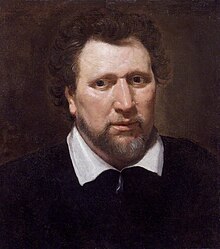Ben Jonson | |
|---|---|
 Portrait by Abraham Blyenberch, c. 1617; oil on canvas painting at the National Portrait Gallery, London | |
| Born | Benjamin Jonson c. 11 June 1572 England |
| Died | 18 August 1637 (aged 65) London, England |
| Resting place | Westminster Abbey |
| Occupation |
|
| Language | Early Modern English |
| Alma mater | Westminster School |
| Period | Before 1597 – 1637 |
| Literary movement | English Renaissance |
| Spouse |
Ann Therese Lewis (m. 1594) |
| Children | 3 |
| Signature | |
 | |
Benjamin Jonson (c. 11 June 1572 – 18 August [O.S. 6 August] 1637) was an English playwright and poet. Jonson's artistry exerted a lasting influence on English poetry and stage comedy. He popularised the comedy of humours; he is best known for the satirical plays Every Man in His Humour (1598), Volpone, or The Fox (c. 1606), The Alchemist (1610) and Bartholomew Fair (1614) and for his lyric and epigrammatic poetry.[1] He is regarded as "the second most important English dramatist, after William Shakespeare, during the reign of James I."[2]
Jonson was a classically educated, well-read and cultured man of the English Renaissance with an appetite for controversy (personal and political, artistic and intellectual) whose cultural influence was of unparalleled breadth upon the playwrights and the poets of the Jacobean era (1603–1625) and of the Caroline era (1625–1642).[3][4]
- ^ Ward 1911.
- ^ The Editors of Encyclopaedia Britannica (12 June 2024). "Ben Jonson". Encyclopedia Britannica. Archived from the original on 12 July 2024.
- ^ "Ben Jonson", Grolier Encyclopedia of Knowledge, volume 10, p. 388.
- ^ Evans, Robert C (2000). "Jonson's critical heritage". In Harp, Richard; Stewart, Stanley (eds.). The Cambridge companion to Ben Jonson. Cambridge, England: Cambridge University Press. pp. 189–202. ISBN 0-521-64678-2.